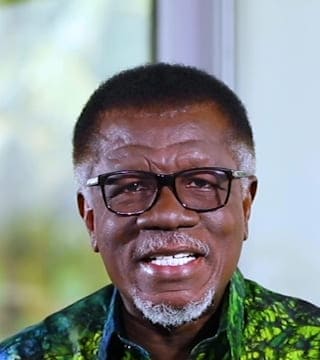Mensa Otabil - When We Feel Inadequate (10/03/2025)
Welcome to a new week. We start a new study from the book of Exodus. It's a follow-up to an earlier study we began a few months ago about the call of Moses in Exodus chapter three. We ended our previous study in verse 10, and we are picking it up from verse 11. So, Exodus chapter 3, verse 11: "But Moses said to God, 'Who am I that I should go to Pharaoh and that I should bring the children of Israel out of Egypt?'" Moses had a very supernatural encounter with God. It's one of those experiences that we think would answer all our questions, embolden us, and make us feel confident.
However, after that encounter with the burning bush and God speaking to Moses, he still felt inadequate. So, he asks, "Who am I to go and do what you are asking me to do, Lord?" The reason was that Moses had fled from Egypt because of a failed attempt to address the oppression of the Hebrews. He tried to rescue an oppressed Hebrew, but the people fought back and resisted his leadership. This rejection by the people he thought he was about to help stayed with Moses for 40 years, and he still had not gotten over his sense of failure and inferiority. Many times, we do things in the past that don't go well, and they linger with us for a very long time, making us feel inadequate.
So, let's consider the questions Moses asked the Lord. The first question is, "How can I stand before Pharaoh? Who am I that I should go to Pharaoh?" Why did Moses ask, "How can I stand before Pharaoh?" Because Moses was a persona non grata in Egypt; he was a wanted man. He had lived most of his life in the royal house of Egypt, with the Pharaoh and the relatives, and he was considered a member of the royal family. However, he betrayed the royal house very severely when he killed an Egyptian and tried to side with the oppressed. Now he knows that he is not wanted; he knows that they are against him. He understands that the story has been repeated; although it has been 40 years, the memory still lingers that Moses is the person who cannot be trusted and must be eliminated when they come into contact with him. Moses understood the power of Pharaoh and the house of Pharaoh, so he said, "I don't think I have what it takes to go face this family. I know them; they are tough."
The second question he asked was, "How can I bring Israel out of Egypt?" Moses had been rejected by the Hebrews, so now he asks, "How can I go to the people who rejected me and hope that this time they will have a change of heart when they haven't seen me for 40 years?" First, he was afraid of Egypt, and then he was also afraid of the Hebrews. Have you ever felt unworthy when God seems to be pushing you, nudging you, directing you to something—a task, something for you to do—and you just feel, "I blew it, I failed at it, I don't have a good testimony, I don't have a good story. How can I ever succeed at something that I failed at?" Well, you are in good company with Moses. He started out as a failure, but God was with him and helped him because God's purposes for us never change, and He is relentless in pursuing us to do the things that He wants us to be. When God has His eyes on you, He doesn't blink. He will keep His eyes on you and pursue you until He gets you to do what He wants you to do. Past failure is not a disqualifier for God's purposes.
Let's pray. Say with me: "Heavenly Father, I feel inadequate to do all the things that You want me to do. Fortify me by Your Spirit for the mission. In Jesus' name, Amen." May the Lord fortify you and help you win this battle. I'm Pastor Mensa Otabil. I'll be with you again tomorrow. Shalom, peace, and life to you.

